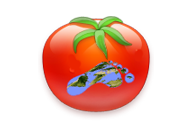
How much does eating locally-produced food help the climate problem? What are the other potential environmental and social benefits of eating locally-grown/produced food? Do you have a food garden in your school or at home? If not, do you want one?
Home Grown >
Grow your own food at home

Starting a garden at home is very beneficial to the environment. It can reduce carbon emissions, reduces pesticide and fertilizer usage, and provides better nutrition. You can start a garden very easily. First you want to make sure the soil is ready, if you take a handful it should fall apart. Clear the surface by removing any plants or weeds, brush or rock. Dig up the Earth and then sift the dirt. Then you can apply a covering to the bottom of your garden like clear or black plastic, cardboard, or old rugs. You need at least six to eight inches of ground for most plants to have enough room for their roots. If you're planning to grow substantial root crops (potatoes, say, or carrots), go deeper still - up to a foot or more. Adding organic material is very crucial for fertile soil.

Starting your own garden can help the environment in many ways. Growing your own food could mean that you don't have to drive to the store to get your food. Which reduces the amount of carbon emissions that are being let out into the atmosphere. You just have to walk to your backyard! It also reduces the amount of plastic waste. There is no packaging on home grown food. Which means less plastic waste overall. Another help to the environment is less food waste. When you grow your own food you have the option to only harvest what you need. Meaning you aren't wasting as much food if you didn't grow your own. Another great way to help the environment is composting! Composting is a method of fertilization but much healthier for the environment. You can recycle your food scraps and yard waste to create a very nutrient-rich soil fertilizer. How does composting even help the environment? It reduces the amount of waste that goes into landfills and instead is being reused. By using the alternative of composting you are also reducing the use of Carcinogenic Pesticides and Fertilizers unlike commercial farming composting is much healthier for the environment. Commercial farming emits harmful chemicals into the air, and also pours harmful chemicals into our soil and water. Filling our earth and the foods that we are consuming with harmful chemicals, some that have even been proven to cause cancer and other diseases.





